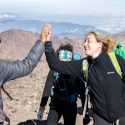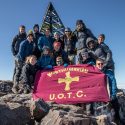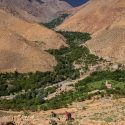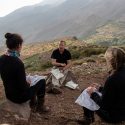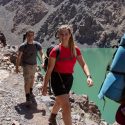In early September 2019 eleven Officer Cadets and three members of staff from Northumbrian Universities Officers’ Training Corps (NUOTC) embarked on a twelve-day high risk and remote expedition to the High Atlas Mountain Region of Morocco, which would include the ascent of the highest mountain in North Africa, Mount Toubkal at 4167m above sea level. All members of the team had previously completed the summer mountaineering foundation (SMF) with the unit but for most Ex NORTHERN ATLAS marked the first significant overseas mountaineering expedition of their progression through the Army’s summer mountaineering scheme. Despite months of planning and preparation there was an understandable sense of trepidation mixed with excitement in the group as we departed St Cuthbert’s Keep in Newcastle early on 2nd September 2019 bound for Marrakech via Manchester.
The group arrived in Marrakech and, after meeting our tour guide, we were faced with our first navigational challenge – how to navigate the bustling squares and twisting alleyways of Marrakech’s Medina district and find our hotel. The hotel itself turned out to be an oasis of calm compared to the overwhelming sights and sounds of this thriving city. It was also an opportunity to enjoy a first group meal and prepare for the move to the Atlas Mountains the following morning. The central hub and start point for most treks in the High Atlas region is the town of Imlil, situated an hour and a half’s drive to the south of Marrakech. Having left Marrakech after breakfast there was a real sense of anticipation in the group as the road began to narrow, the terrain became more rugged and the mountains grew in the bus’s windscreen.
On arrival in Imlil we were met by Ibrahim, a hugely experienced Berber guide, who would become a vital member of the team over the following nine days. Ibrahim modestly told the group that he had 26 years of guiding experience in the Atlas Mountains and when pressed about the number of times he had climbed Mount Toubkal he estimated the number ran as high as 2500 times! We were in safe hands. The group were also met at the gite by members of the Royal Moroccan Armed Forces mountain battalion and Gendarmerie who would be accompanying us for the trek. Although the Moroccans had a few English speakers, the attendance of two French speaking Officer Cadets really aided our ability to plan and communicate with our Moroccan colleagues. Once plans had been finalised the group, now numbering some 25 strong, embarked on a short acclimatisation walk to the village of Aroumd to check kit, rehearse emergency procedures and understand a little of the terrain that would be crossed in the coming days.
The main trek started on the morning of 4th September 2019 and once the group’s rucksacks had been loaded onto our trusty team of mules we started the winding 1000m ascent from Imlil to the first campsite 14km away in the village of Tacheddirt. The gradual ascent along tree lined valleys and along well-established tracks to our first campsite was an excellent introduction to the terrain of the Atlas Mountains and enabled the Officer Cadets to find their mountain legs. Once camp was established Ibrahim took the majority of the group to a nearby waterfall which provided an opportunity for a ‘bracing’ but much needed natural shower. Suitably refreshed we were treated to the first of many tagines, a traditional Moroccan dish of meat and couscous, which became the staple evening meal of the expedition before retiring to our tents ready for the early start the following morning.
It was decided by Ibrahim and the group leaders to break camp an hour before first light and start the 1300m ascent to the ridgeline by torchlight. Such an early start allowed the group to slowly climb the long, rocky incline in the shade of the surrounding mountains and avoid the heat of the day. The climb up to Tizi Likemt at 3555m was the first real challenge of the expedition and all of the group were aware that they could start to feel the effects of altitude and display some of the symptoms which had been discussed in pre-expedition. However, the steady pace and regular rest stops ensured that after three and a half hours of climbing the whole team were feeling strong as they crested the ridgeline and where they were greeted by the first view of Mount Toubkal itself. The dominating peak loomed over the group’s entire descent to a picturesque riverside campsite next to the village of Azib Likemt. Despite being only two days into the trek everyone had quickly adapted to the routine of pitching tents and doing some administration prior to afternoon tea, group briefings, evening meal and uncountable rounds of cards under the stars. For most of the Officer Cadets this was their first experience of living for multiple days under canvas and as their confidence increased they clearly became comfortable living in the austere mountain valleys, which were a world away from their student digs in central Newcastle or Durham.
The next leg of the trek took the group from Azib Likemt to the most southerly point of the trek at Amsourzert. As we crossed ridges and handrailed river valleys it became apparent that we were truly in the remote heart of the Atlas Mountains. The steady stream of other tourist groups trekking towards Mount Toubkal had been replaced by an infrequent trickle of locals who offered their ‘salaams’ as they rode their hardy mules between the isolated mountain villages. Throughout the 16km leg the group trekked in the shadows of the 4000m peaks above and were subjected to a biting wind as cold mountain air streamed through the passes, which made us glad that we had packed for the surprisingly cold conditions. The town of Amsourzert was nestled within a lush green valley and our arrival came with a pleasant surprise. Tired and windswept the group were ushered into a building for what we presumed would be another round of the ubiquitous sweet mint tea, however as Ibrahim showed us the bedrooms the Officer Cadets soon realised that this would be their home for night, complete with hot showers and comfy beds. The revelation came not a moment too soon as that afternoon a large thunderstorm and torrential rain hit the valley and continued well into the night. Pleased not to be camping the group made the most of the comfortable surroundings to rest before starting the slow climb up towards the ultimate goal of Mount Toubkal.
The following day involved a short but steep ascent to a stunning campsite on the shore of Lac D’Ifni, a bright blue lake at an altitude of 2300m. After lunch most of the group took to opportunity to wash and swim in the beautiful but bracing water before they settled in for the night in the shadow of the looming 4000m peaks. The group woke at 4.45am ready for what was to be the most challenging leg of the trek so far; a steep climb of over 1300m to the Tizi N’Ouanoums pass (3684m) before the long down hill stretch to a bivouac location at Les Mouflons Refuge at the base of Mount Toubkal. The climb followed what felt like a goat track and our group was followed by the cries of the local mountain breed as, for four and a half hours, we slowly inched our way uphill towards the band of sunlight at the top of the pass. After what felt like an eternity of climbing there was a real sense of achievement as everyone made it to the top and looked down into the stunning valley below. Whilst the long downhill stretch to the Refuge was less physically demanding than the uphill it required intense concentration to stay balanced on the loose rocks. On arrival at the campsite the whole group were ready for a refreshing mint tea and to use the shower facilities provided at the reasonable price of 10 dirhams (£1) in the well-established refuge. The bivouac at Les Mouflons Refuge was the highest campsite the group had slept at so far and as they set up their tents outside of the grey stone Refuge building some of us undoubtedly felt the effects of the altitude, despite our gradual acclimatisation.
This acclimatisation was to prove useful as the group prepared to climb over 4000m twice in two days with an ascent of Mount Ouanoukrim (4089m) and then Mount Toubkal itself. Ouanoukrim was planned as a rehearsal for Mount Toubkal and aimed to give the group the best possible chance of success on Toubkal itself. The mountain sits at the opposite side of the valley from Toubkal and offers unparalleled views of its more famous neighbour. Despite this no other groups were on the mountain and it felt like the mountain was our own as we made our way up Ouanakrim’s craggy slopes. As the sun beat down at the top everyone was able to take in the views of the surrounding mountains full of confidence ahead of the main climb the following day.
At first light on 10th September 2019 the group stepped off from Les Mouflons Refuge ready for the 950m climb to Toubkal’s peak. The skies were clear but the wind was bitterly cold as we zigzagged up the steep but well-worn path to the ceiling of North Africa. The altitude began to have a noticeable effect; as the air thinned breathing became more difficult and the temperature dropped to below freezing. Yet these discomforts were soon forgotten on the final stretch of the climb as the whole of the Atlas Mountain region opened up below us. As the peak came into sight the group followed Ibrahim like penguins in the wind until we approached the large metal triangle that marked the summit. At 4167m the team were the highest people in North Africa and could take in the panoramic views of the Atlas Mountains. All of the OCdts and staff made it to the top and we were greeted by high fives from Ibrahim and a celebratory snack at the top. Suitably decked out in multiple layers of warm kit there were the obligatory series of group photos and selfies at the summit before we descended towards Les Mouflons via a different route. The valley through which we walked had been the site of a plane crash in the 1960s and was still strewn with wreckage. It was a somber reminder of the dangers of the mountains and as we paused for a moment of reflection at the site of the graves of the victims there was a melancholy mood in the group that contrasted with the highs we had experienced just a few hours before. By the time we arrived at basecamp we were suitably exhausted, however a congratulatory afternoon tea accompanied by local pancakes laden with Moroccan Nutella was a welcome reward for the efforts of the day.
The final day of the trek was a simple gradual downhill route north back towards Imlil and the guest house that we had left eight days before. Along the route we parted ways with the chefs and the mule handlers who had been accompanying us. We said our goodbyes over a few cups of the omnipresent mint tea before continuing back to the guest house with a feeling of satisfaction for what had been achieved but disappointment that the journey was coming to an end. However, this disappointment soon disappeared as we arrived at the gite with all the home comforts that had been missing in the hills. That night, after a cathartic warm shower, we exchanged gifts with the Moroccan Armed Forces and Gendarmerie who we had got to know so well over the last eight days.
The following morning we said cheerio to the mountains and returned to the place where it all began – Marrakech – ready to sample Moroccan culture and explore the souks. The hotel’s roof terrace provided us with an oasis of calm in the bustling city and as the sun went down we were able to reflect on everything that we had seen and achieved during the expedition.
One of the students described the trek as, “an experience that I will never forget”, and for most successfully summiting Mount Toubkal was the main achievement.
An Officer Cadet said that looking back:
“Summitting Mount Toubkal was the highlight. The view was unbelievable and the fact that we all made it to the top together made it really special”.
The trek enabled all of the students to develop their understanding of summer mountaineering, including navigation, group management and field administration in the incredible surroundings of Morocco’s High Atlas region. For most of the Officer Cadets it was their first experience of high altitude trekking and sleeping under canvas for multiple days and therefore provided invaluable log book experience for individuals wanting to progress through the Army’s summer mountaineering scheme. However, the expedition was not without its challenges. The team had to learn how to deal with the effects of altitude and the importance of gradual acclimatisation, especially in hot conditions. Whilst all of the team summited Mount Toubkal, for some it was a significant challenge with one of the team members noting that the trek had enabled them to:
“understand how far I can push myself physically and mentally”.
Overall Ex NORTHERN ATLAS should be viewed a resounding success. The exercise undoubtedly met the aims of Army adventurous training; all of the group developed their summer mountaineering ability, achieved the primary objective of summiting Mount Toubkal and had a hugely rewarding experience in a culturally rich and diverse country.
Sincere thanks must go to the Officer Cadets who contributed so much to the expedition, our incredibly experienced guide Ibrahim and the excellent NUOTC staff instructors without whom the expedition could not have happened. It is also necessary to note the significant contribution provided to the expedition by organisations such as The Ulysses Trust, Reserve Forces and Cadets Association (RFCA) and Adventurous Training Group who provided outstanding help and guidance throughout.
Written Credit: B Norfield
Photo Credit: B Norfield

